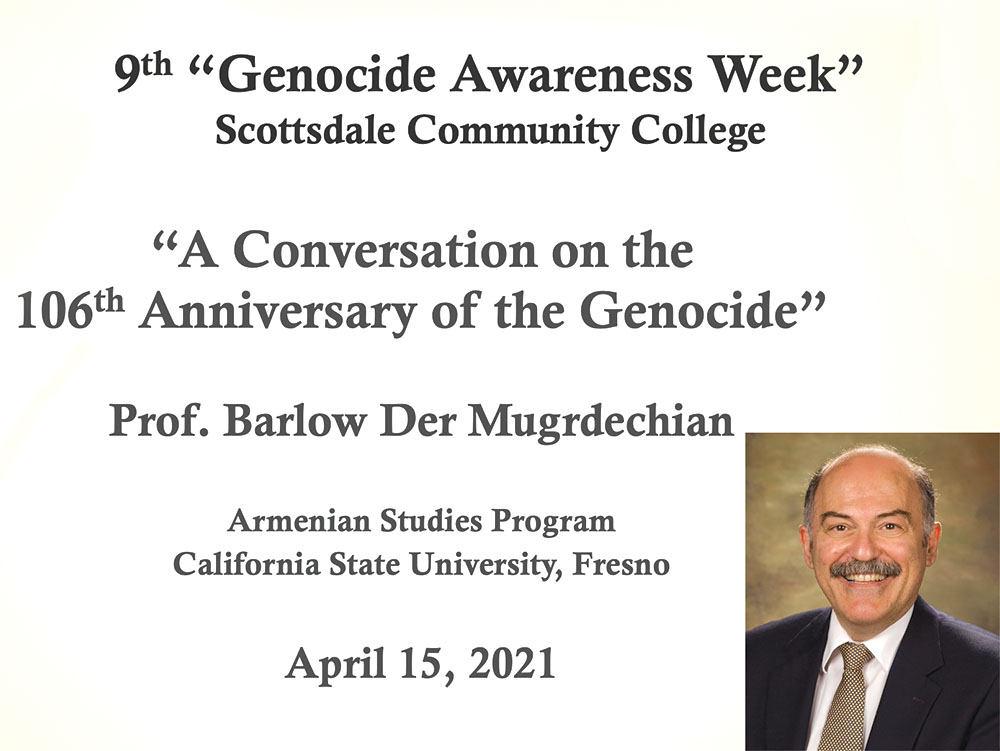
Dustin Vartanian
Staff Writer
“The continued denial of the Armenian Genocide equals a continuation of the Genocide,” stated Prof. Barlow Der Mugrdechian.
Evidence of the Armenian Genocide is plentiful: the population of Armenians living in the Ottoman Empire decreased by seventy-five percent after World War I. Thousands of Armenian churches existed throughout the Ottoman Empire, while only a handful remain today. Eye-witness accounts and publication of works such as Ambassador Morgenthau’s Story have provided also valuable documentation of the Genocide.
Prof. Barlow Der Mugrdechian gave a presentation “A Conversation on the 106th Anniversary of the Armenian Genocide,” for Scottsdale Community College’s 9th annual “Genocide Awareness Week” on Thursday, April 15. Organized by Prof. John Liffiton, the “Genocide Awareness Week” is supported by Fr. Zacharia Saribekyan and the St. Apkar Armenian Apostolic Church of Scottsdale, Arizona, and by the Armenian Studies Program at Fresno State. Prof. Der Mugrdechian’s presentation focused on the evidence that demonstrates the Armenian Genocide is still continuing today.
“The Armenian Genocide is not really over,” said Prof. Der Mugrdechian, as he demonstrated that the policies of the Republic of Turkey and Azerbaijan today are a continuation of the Genocide. Political denial and physical destruction of monuments are used to hide the past. For example, Article 301 of the Turkish Penal Code limits free speech for anyone who “denigrates the Turkish Nation.” Prof. Der Mugrdechian explained this action by the Turkish government as an obvious sign of a way to limit speech on the Genocide. Anyone convicted of violating Article 301 can face from six months to two years in person.
Another example that Prof. Der Mugrdechian mentioned was a recent statement by President Ilham Aliyev of Azerbaijan, claiming that Armenia’s capital Yerevan is historic Azerbaijani land, a direct threat against the Armenian people.
Physically, the destruction of Armenian monuments, churches, khatchkars, or any other structure displaying elements of Armenian culture, is an attempt to erase the history of the Armenian people, according to Prof. Der Mugrdechian.
This is “the final stage of Genocide” as Armenian monuments have been leveled over the past one hundred years and they continue to face destruction today. Several photographs of Armenian churches, taken before and after their demolition, were shown during the presentation. The photos are evidence that the churches and monuments were intentionally demolished by use of explosives, as it is not possible for that scale of destruction to have occurred by natural causes.
These actions aim to erase the “cultural memory” of the Armenians, as the Genocide deniers claim that Armenians was nonexistent in their historic homeland. Prof. Der Mugrdechian also explained that destruction of cultural monuments, experienced in all examples of Genocide throughout the world, “is an integral part of modern genocide.”
One of the most recent and clearest pieces of evidence of the continuation of the Armenian Genocide was seen during the war between Azerbaijan and the Republic of Artsakh that took place September 27-November 9, 2020. The Azeri military, said Prof. Der Mugrdechian, targeted Armenian hospitals, churches, and other civilian institutions during the war. These are human rights violations that have gone unpunished. After the war, the newly ceded territories witnessed even more destruction by Azerbaijan, as photographs of Azeri soldiers were shown vandalizing churches and destroying Armenian cemeteries.
Until today, Azerbaijan still holds Armenian prisoners of war. In addition, President Aliyev recently opened a “Military Trophy Park” in Baku to celebrate the Azeri victory. In this museum, hundreds of helmets of dead Armenian servicemen are displayed, as well as wax figures of Armenian service men that appear to be dying or dead.
Armenia’s ombudsman Arman Tatoyan said that the establishment of this Azeri museum is “proof of Genocidal policy that clearly confirms institutional hatred towards Armenians in Azerbaijan.” Overall, the latest human rights violations committed by Azerbaijan are an example of why Armenians are persisting in setting the record straight on the Genocide. As Prof. Der Mugrdechian concluded, “if the Genocide is continually denied there is a good possibility that the Genocide could happen again.”
The 9th Annual “Genocide Awareness Week,” held virtually April 12-17, 2021, is a series of lectures, and exhibits that “seeks to address how we, as a global society, confront violent actions and current and ongoing threats of genocide throughout the world, while also looking to the past for guidance and to honor those affected by genocide.”
It has been proven multiple times that a lack of awareness and action result in a continuation of crimes committed against humanity.
 Hye Sharzhoom Armenian Action
Hye Sharzhoom Armenian Action